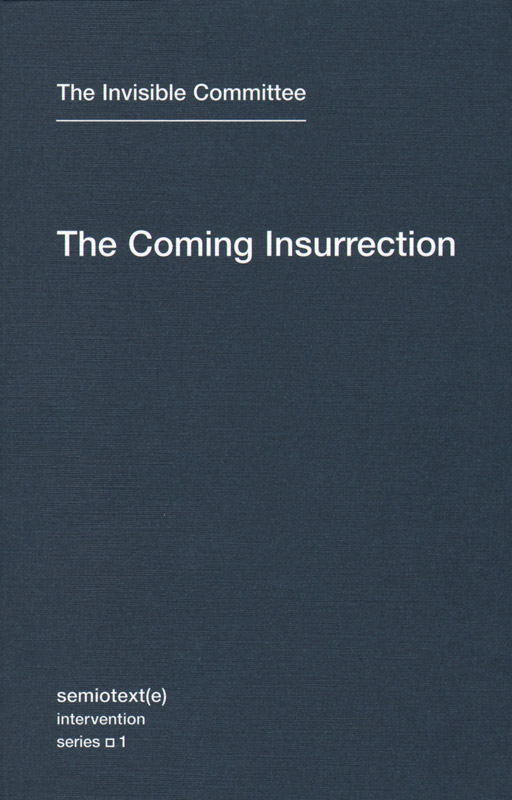(by Joe)
"What am I? Tied in every way to places, sufferings, ancestors, friends, loves, events, languages, memories, to all kinds of things that obviously are not me. Everything that attaches me to the world, all the links that constitute me, all the forces that compose me don't form an identity, a thing displayable on cue, but a singular, shared, living existence, from which emerges - at certain times and places - that being which says "I." Our feeling of inconsistency is simply the consequence of this foolish belief of the permanence of the self and of the little care we give to what makes us what we are."
My copy of the book looks like this.
There is a muddy area where my philosophical research and my political beliefs meet, and the above quote, from The Coming Insurrection (Invisible Committee, 2009: 31-2), sums it up nicely. The Coming Insurrection was written in 2007 by an anonymous collective (calling themselves 'The Invisible Committee') based in France, and it is clearly strongly influenced by the philosophy of that country, most notably the situationist movement of the 1960's, but also continental philosophy more broadly. It is pompous, vague and quite rightly criticised by many in the left-libertarian circles that I inhabit - Django over at Libcom described it as "a huge amount of hyperbole and literary flourish around some wafer-thin central propositions". Nonetheless, the approach towards the self expressed in the above extract appeals to me.
Put very crudely, I think that the self is an illusion or an abstraction, a "narrative center of gravity" that helps guide our lives and our interactions with others (Dennett, 1992). The mechanisms behind this formation of the self have evolved for a reason, and for pragmatic reasons we shouldn't strive to eliminate it entirely, but to focus on it too much is unhealthy and unhelpful. Such a focus has, since the enlightenment, led to a heightened sense of individualism throughout the western world, one which I think is at the heart of our capitalist, consumerist and ultimately selfish culture. We can overcome this individualism by studying what the self truly is, and perhaps eventually realising that it doesn't truly exist.
There is an obvious link with Buddhist philosophy here, one which I am currently trying to learn more about. There is also a somewhat less obvious link with embodied cognition, and in particular the extended mind hypothesis (Clark & Chalmers, 1998). If the self is an illusion constructed by our mind, and that mind is embedded in, or even extended into, its environment, then the self can be thought of as a product of that environment. This could have quite serious consequences, not only for metaphysics and the philosophy of mind, but also for ethics and political philosophy.
Which brings us back to The Coming Insurrection. In the passage I quoted, they describe the sense of "inconsistency" that we feel when we realise that whilst the self is composed of our interactions with things in the world, those things "obviously are not me". The self is invisible, and however hard we try to look for it we can never find it. David Hume expressed a similar feeling when he wrote that "I never can catch myself at any time without a
perception, and never can observe any thing but the perception"(A Treatise of Human Nature: Book 1, Part 4, Section 6). We are what we do, and what we do is interact with the world. The focus on the individual over the last few hundred years has clouded that fact, and created an entity, the solid, 'real' self, that does not in fact exist. In coming to understand that who we are is so heavily dependent upon who others are, I hope we might eventually be able to learn to behave more compassionately and co-operatively with other people, as well as with our non-human environment. Satish Kumar embodies this hope in the phrase "You are, therefore I am" (Kumar, 2002), a play on Descarte's "I think, therefore I am", itself a perfect slogan for enlightenment individuality.
There is also an element of the absurd that is recognised, I think, by both Hume and the Invisible Committee. We are confronted with on the one hand an unshakable conviction in the existence of the self, and on the other with convincing evidence that no such thing exists. Similar absurdity can be found in our struggles with free will, moral realism and even scepticism about the external world. In each case a pragmatic route must be found, one that allows us to go on, but at the same time acknowledges the truths that we have learned about the world. In the case of the self, I think that this means accepting that we are a lot closer to the world around us than our privileged, first person view-point makes it seem, and that in order to survive in such a world we must understand and respect our place in it.
There's a lot more I'd like to say about a lot of things here, but I'll save it for future posts. Otherwise we might get complaints about the lack of monkeys!
Here you go.
Clark, A. & Chalmers, D. 1998. "The Extended Mind." Analysis 58: 7-19.
Dennett, D. 1992. "The Self as a Center of Narrative Gravity."
Invisible Committee, The. 2009. The Coming Insurrection. Los Angeles, LA: Semiotext(e).
Kumar, S. 2002. You Are Therefore I Am: A Declaration of Dependence. Totnes, UK: Green Books.


No comments:
Post a Comment